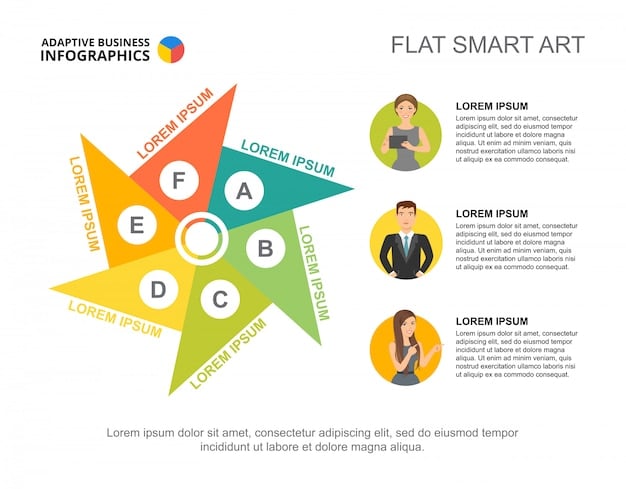Ace Your Next Interview: Proven Strategies to Shine

Ace Your Next Interview: Proven Strategies for Answering Tough Questions offers actionable techniques to confidently handle challenging interview scenarios and make a lasting impression. Master the art of answering difficult questions and boost your chances of landing your dream job.
Landing a job interview is a significant step, but the real challenge lies in confidently navigating the interview itself. Many candidates find themselves stumbling over tough questions, unsure how to present themselves effectively. This guide focuses on how to ace your next interview: proven strategies for answering tough questions, ensuring you’re well-prepared and leave a lasting impression.
From behavioral questions to curveballs about your weaknesses, mastering the art of answering these questions is key to showcasing your skills and personality. Let’s dive into practical techniques to help you succeed.
Understanding the Interview Landscape
Before delving into specific strategies, it’s crucial to understand the interview’s purpose. Interviews are two-way conversations aimed at determining if there’s a good fit between the candidate and the company. Prepare to demonstrate your skills, experience, and personality effectively. Effective communication and a clear understanding of the company’s needs are essential.
Types of Interview Questions
Knowing the different types of questions you might face can significantly boost your preparation. Here are some common categories:
- Behavioral Questions: These questions explore how you’ve handled situations in the past.
- Technical Questions: Common in technical roles, these assess your knowledge and skills in specific areas.
- Situational Questions: These present hypothetical scenarios and ask how you would respond.
- Personality Questions: These aim to understand your character, values, and how well you align with the company culture.
Understanding these categories allows you to tailor your responses and showcase your strengths effectively. Being ready for each type of question will help you ace your next interview: proven strategies for answering tough questions involve anticipating these different formats.
In conclusion, understanding the interview process and question types sets the stage for more effective preparation. Addressing each category thoughtfully will enhance your chances of success.
Mastering the STAR Method for Behavioral Questions
Behavioral questions are a staple of interviews, probing your past experiences to predict future performance. The STAR method (Situation, Task, Action, Result) provides a structured approach to answering these questions effectively. By using the STAR method, you can clearly communicate your experiences and demonstrate your capabilities.
Breaking Down the STAR Method
Let’s examine each component of the STAR method:
- Situation: Describe the context or situation in which you faced a challenge.
- Task: Explain the specific task or goal you needed to accomplish.
- Action: Detail the actions you took to address the situation or complete the task.
- Result: Share the outcome of your actions, highlighting what you achieved and learned.
Using the STAR method helps you structure your response, making it clear, concise, and impactful. Remembering this method will help you ace your next interview: proven strategies for answering tough questions related to past behavior.

In summary, the STAR method is an invaluable tool for answering behavioral questions. Structuring your responses with this method demonstrates your ability to handle challenges and achieve positive outcomes.
Addressing Weaknesses and Failures Honestly
Interviewers often ask about your weaknesses or failures to assess your self-awareness and ability to learn from mistakes. Honesty and a growth mindset are crucial in answering these questions. Frame your response to show how you’ve turned weaknesses into strengths.
How to Frame Your Answer
Here’s how to approach questions about weaknesses:
- Choose a Real Weakness: Select a genuine area where you can improve.
- Explain How You’re Addressing It: Show that you’re actively working to overcome the weakness.
- Focus on Learning: Highlight what you’ve learned from past failures and how you’ve grown.
- Turn it Positive: After addressing the weakness, redirect the focus to your key strengths to maintain a positive and confident tone.
This approach demonstrates self-awareness, accountability, and a commitment to personal development. Knowing how to address a weakness will inevitably help you to ace your next interview: proven strategies for answering tough questions about shortcomings and turn them into strengths.
Effectively addressing questions about your weaknesses requires honesty, self-awareness, and a focus on growth. Presenting your response with these elements will leave a positive impression on the interviewer.
Preparing for Tricky or Unexpected Questions
Some interviewers like to throw curveball questions to assess how you think on your feet. These can range from brain teasers to unusual personal questions. The goal isn’t always to get the “right” answer but to see your thought process and how you handle pressure. Practicing strategies to handle unexpected questions can assist you to ace your next interview: proven strategies for answering tough questions regardless of the situation.
Strategies to Handle Unexpected Questions
Consider these strategies for those curveball questions:
- Take a Moment to Think: It’s okay to pause and consider your response.
- Ask for Clarification: If the question is unclear, ask the interviewer to rephrase it.
- Show Your Reasoning: Explain your thought process as you work through the problem.
- Be Honest: If you don’t know the answer, it’s better to admit it than to make something up.
Remember, it’s about demonstrating your problem-solving skills and ability to remain composed under pressure. Thinking on your feet is a valuable skill that interviewers often seek.

Effectively handling tricky or unexpected questions showcases your adaptability and problem-solving abilities. By taking a moment to think, asking for clarification, and explaining your reasoning, you can navigate these challenges with confidence.
Researching the Company and Asking Insightful Questions
Effective interview preparation extends beyond just practicing answers to commonly asked questions. It involves thorough research on the company and preparing thoughtful questions to ask the interviewer. Doing this sort of research allows you to ace your next interview: proven strategies for answering tough questions involve being informed. Research demonstrates your genuine interest and engagement.
Why Company Research Matters
Here’s why researching the company is crucial:
- Showcases Your Interest: It demonstrates that you’re genuinely interested in the company and the role.
- Allows Tailored Answers: You can tailor your responses to align with the company’s values and goals.
- Helps You Assess Fit: It provides you with the information you need to determine if the company is a good fit for you.
Preparing insightful questions showcases your critical thinking and engagement. Demonstrating your critical thinking skills is an important way that you can ace your next interview: proven strategies for answering tough questions, they are always about showing your best self and proving you have the skill sets for success.
In summary, thorough company research and thoughtful questions significantly enhance your interview performance. It highlights your interest, allows for tailored responses, and helps you assess if the company aligns with your career goals.
Practicing and Refining Your Interview Skills
Practice makes perfect, and this holds true for interviewing. The more you practice your answers and interview skills, the more confident and polished you’ll become. Engage in mock interviews and seek feedback to refine your approach. Practicing is a critical part of the strategy to ace your next interview: proven strategies for answering tough questions require preparation.
Techniques for Effective Practice
Consider these techniques for effective interview practice:
- Mock Interviews: Conduct mock interviews with friends, family members, or career coaches to simulate the real experience.
- Record Yourself: Record yourself answering common interview questions and review the footage to identify areas for improvement.
- Seek Feedback: Ask for honest feedback on your responses, body language, and overall presentation.
Additionally, practice active listening and non-verbal communication skills to enhance your overall interview performance. Being able to listen intently and give appropriate responses will show respect and focus.
In conclusion, consistent practice and targeted feedback are essential for refining your interview skills. Utilize mock interviews, self-recording, and feedback sessions to boost your confidence and prepare to shine in your next interview.
| Key Point | Brief Description |
|---|---|
| 💡 STAR Method | Use Situation, Task, Action, Result to answer behavioral questions effectively. |
| 💪 Address Weaknesses | Be honest, but focus on growth and how you are improving. |
| 🧐 Company Research | Research to show interest and tailor answers. |
| Practice 🎭 | Engage in mock interviews for refinement. |
Frequently Asked Questions
The STAR method (Situation, Task, Action, Result) is a structured approach to answering behavioral questions. It helps you provide clear, concise, and impactful responses by organizing your experiences effectively.
Be honest about a real weakness, explain how you’re addressing it, focus on what you’ve learned, and redirect the focus to your strengths. This shows self-awareness and a commitment to personal growth.
Researching the company showcases your interest and helps you tailor your answers to align with their values and goals. It also helps you ask thoughtful questions during the interview.
It’s better to admit you don’t know the answer than to make something up. You can also offer to find the information later or discuss a similar topic you’re familiar with.
Practice is essential! It helps you become more confident, refine your responses, and handle unexpected questions with poise. Mock interviews and self-recordings are valuable tools.
Conclusion
Mastering the art of answering tough interview questions requires preparation, self-awareness, and practice. Utilize these strategies, including the STAR method and company research, to ace your next interview: proven strategies for answering tough questions in any scenario. Focus on presenting your best self, communicate effectively, and highlight what you uniquely bring to the table.
By understanding the interview landscape, practicing your responses, and demonstrating your genuine interest, you can greatly improve your chances of landing your dream job. Embrace these strategies to showcase your skills, personality, and potential, leaving a lasting positive impression.





